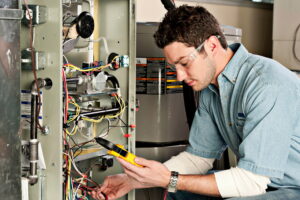
If it’s time to invest in a new heater for your home, you may be considering gas over electric. A gas heater has a lot of benefits, but it also has some downsides as well. Before you make the change, it’s important to understand the pros and cons of switching to gas heating. Either way, our team is here to help you make the decision.
We can offer a free assessment of your home and outline your options – both electric and gas heating – so you can make an educated decision. After all, we are the pros of heating maintenance in Montgomery County. And once you pick the system that’s right for your home and family, we can handle the installation process to make it easy and simple for you.
Pros of Gas Heating
Gas heating offers a lot of great benefits over electric heating. It’s why so many homeowners have gas heaters installed in their homes for the winter season. The top three benefits of a gas heater include:
Heating Your Home Faster
Gas heaters utilize burners and an ignition system for creating heat. This means that they can create a lot of heat quickly and maintain it over time. The burners get very hot, so it’s easy for a gas heater to reach a maximum temperature in a short period of time compared to an electric system. This can mean that your gas heater doesn’t use as much energy since it doesn’t have to stay on as long to heat your home.
Gas Heaters Cost Less
In fact, gas heaters are so energy efficient that they can save you up to 50% on your heating bills compared to electric heating. This is especially true for homeowners that live in colder climates, like ours. Electric heaters can really struggle to heat your home efficiently when temperatures drop below freezing, but gas heaters don’t have that problem.
Gas Heaters are Adaptable
Many homeowners think of gas heaters being high maintenance because of the added gas line and precautions that need to be taken. But gas heaters are actually very adaptable to install if you’ve never had one before. They can easily connect to your home’s current HVAC system. There’s no need for a major overhaul or complete replacement of what you already have. If you want to keep your existing cooling system and only replace the heater, that’s a possibility.
Cons of Gas Heaters
Like everything, gas heaters do have some downsides. It’s important to understand the cons of gas heaters, too, so that you know exactly what to expect from your new investment.
Expensive Installation
Gas heaters are well known for their cost-efficiency to run from month to month, but the initial installation can be costly. In fact, a gas heater is significantly more expensive than an electric heater. We can help you estimate your monthly energy savings and factor that into the overall cost of your gas heater compared to an electric heater. Then you can decide whether the initial cost is a deal breaker or whether the monthly savings will eventually pay for the unit.
Shorter Lifespan
You can expect a gas heater to last for between 15 to 20 years. This is an impressive lifespan, but it’s still shorter than what you could get out of an electric heater, which will last 20 to 30 years.
More Maintenance
A gas heater usually has higher maintenance expectations compared to an electric heater. Gas heaters utilize combustion to create heat, and it can be a dirty process. Your gas heater can have residue and soot that need to be cleaned off. Plus, you want to make sure that everything is in good working order to avoid carbon monoxide leaks.
But our team is here to help. From doing research to installation to annual maintenance, the team at Carney Plumbing Heating & Cooling does what’s right for our customers.

